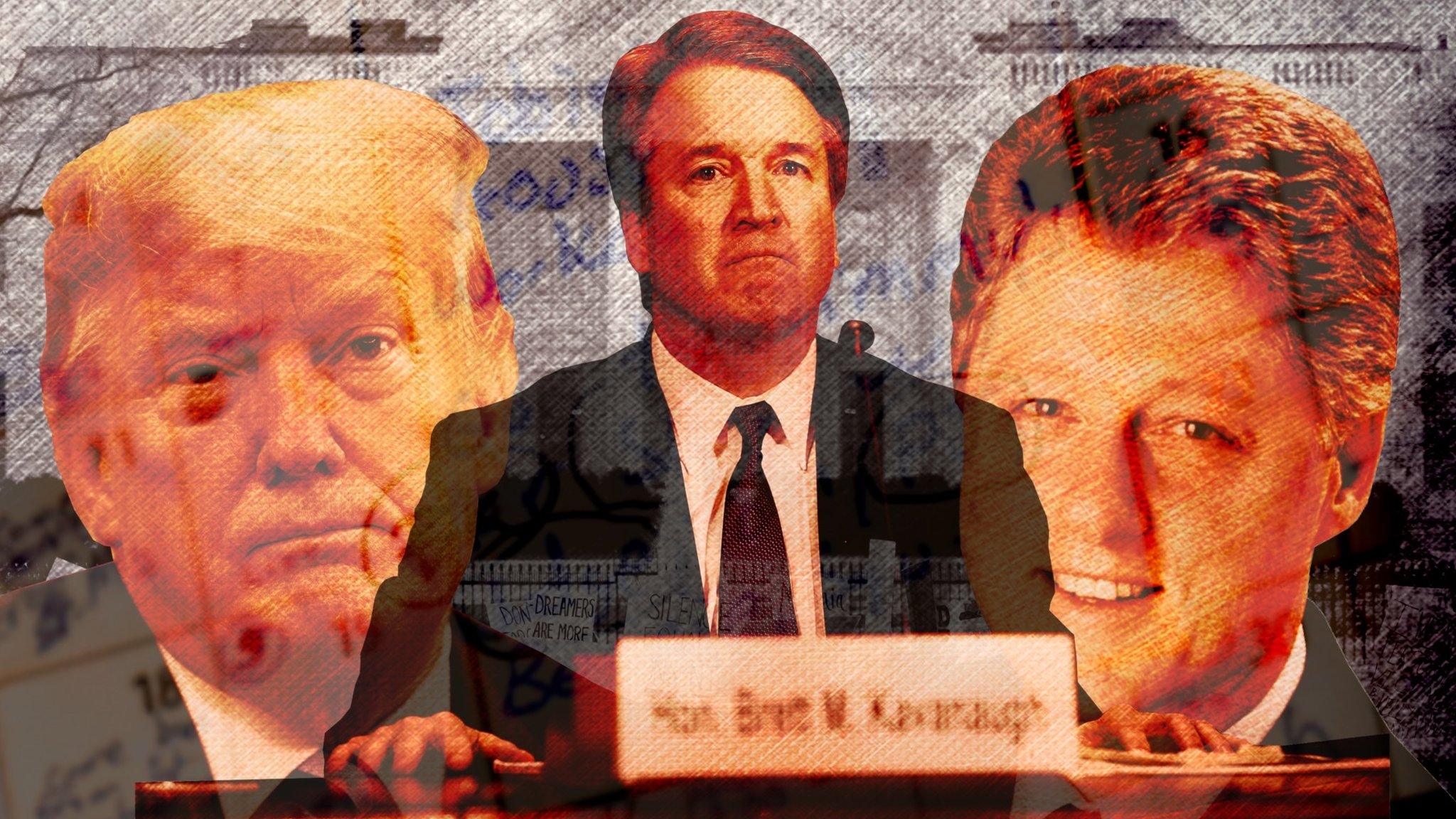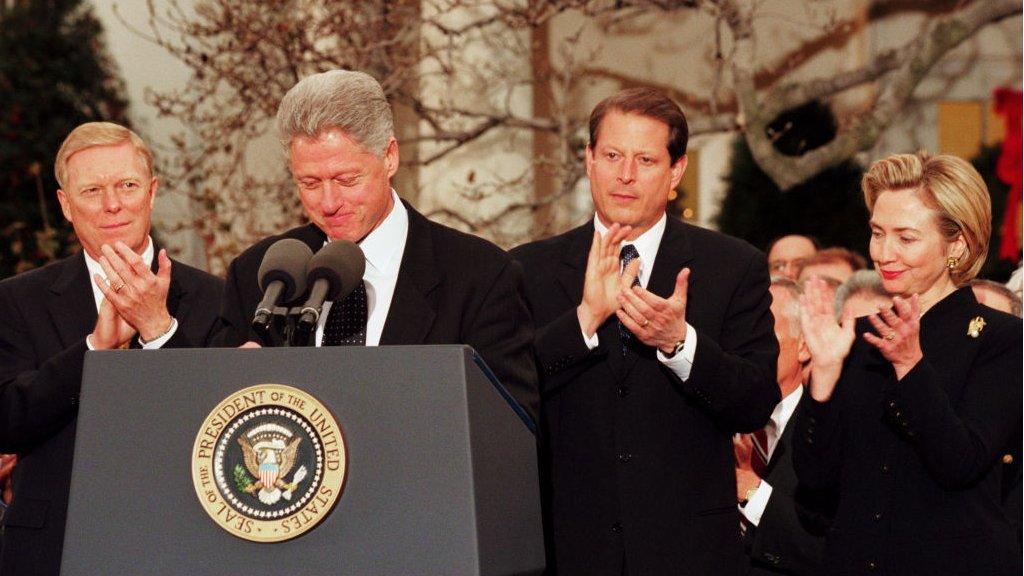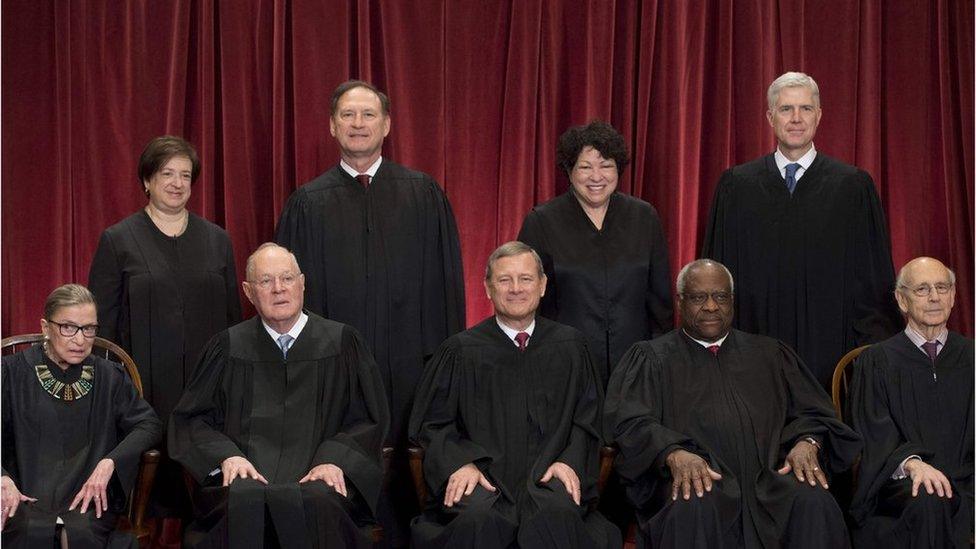Brett Kavanaugh deploys the Trump and Clinton playbook
- Published

In a Washington that is ever more tribal and in a country that is ever more polarised, the question of who do you believe has now become secondary to the question of whose side are you on.
Almost everything comes to be viewed through the prism of politics, whether it is the harrowing testimony of Christine Blasey Ford or the combative rebuttal of Brett Kavanaugh, the Supreme Court nominee she accused of sexually assaulting her.
Modern-day Washington is about scoring partisan points. Winning tribal battles. The pursuit of the truth seems far less important than the pursuit of an outright political victory. Zero sum politics at its most rancorous and bloody.
What we are watching in the Kavanaugh confirmation process is the latest clash in a partisan and ideological war that's been intensifying for decades, and which has been fuelled by the Trump presidency and the MeToo campaign.
As it rages, the fight for public opinion remains important. Congressional mid-terms elections, which will determine who controls Capitol Hill, are just weeks away after all. But in such a divided country, where opinions are so firmly entrenched, political mobilisation is just as important as political persuasion - probably more so.
Rally the base is the mantra of these vicious times. That is what we witnessed yesterday in that climactic hearing, and also in the weeks leading up to it.

In this struggle for power, ugly lessons have been learned from the recent past.
Consider President Bill Clinton's response to the crisis that engulfed his presidency following what is still called the Monica Lewinsky scandal but which should rightly be renamed the Bill Clinton scandal.
When in the summer of 1998 the president's lies about his affair with the young White House intern were exposed, and his denials were no longer scientifically tenable, he delivered a televised address noteworthy less for its grudging admission of personal wrongdoing and more for his attack on the special prosecutor Kenneth Starr and his Republican sponsors.
"This has gone on too long, cost too much and hurt too many people," he seethed, squinting at the camera and struggling to contain his rage. Clinton was trying to turn a national debate about his reckless behaviour into a partisan referendum: who do you want to win, the Democratic president or his Republican tormentors.
It wasn't about him. It was about them.

Clinton adopted the same strategy following his impeachment by the Republican-dominated House of Representatives later that year, holding an extraordinary pep rally on the South Lawn of the White House just hours after he became only the second president in US history to suffer that ignominious fate.
"We must stop the politics of personal destruction," he thundered, with dozens of Democratic lawmakers standing in support behind him. "We must get rid of the poisonous venom of excessive partisanship, obsessive animosity, and uncontrolled anger."
In the subsequent Senate trial, convened to determine whether he should be removed from office, members of his party answered his tribal call. All 45 Democrats voted not guilty. He had successfully turned the climax of the impeachment crisis into a party line vote.

When the Access Hollywood tape surfaced late in the 2016 presidential campaign, Donald Trump adopted the same playbook.
Refusing to step down as a presidential candidate, just as Bill Clinton had refused to resign from the presidency, he counter-attacked and mobilised his base. Initially, he thought of holding a rally at a Manhattan hotel, but settled instead for appearing before cheering supporters who had gathered at the foot of Trump Tower.
That weekend he also went on the political offensive by inviting some of Bill Clinton's female accusers to appear in a press conference just hours before his first presidential debate with Hillary Clinton. Trump was framing the Access Hollywood debacle in the same way that Bill Clinton had cast the impeachment debate: who do you want to win?
In the Kavanaugh hearings, we have seen the same battle lines drawn and the same battle plans deployed. Brett Kavanaugh's opening statement doubled as a call to arms.
Kavanaugh lashed out at Democrats for "destroying his family and good name".
To a president said to be angry that Christine Blasey Ford had delivered such powerful testimony, and frustrated by his nominee's passiveness earlier in the week during an interview with Fox News. To Republican waverers in the Senate. To conservative voters who send them to Washington. To right-wing opinion leaders on Fox News and elsewhere.
"This whole two-week effort has been a calculated and orchestrated political hit, fuelled with apparent pent-up anger about President Trump and the 2016 election, fear that has been unfairly stoked about my judicial record, revenge on behalf of the Clintons and millions of dollars in money from outside left-wing opposition groups."
Trump aide Kellyanne Conway had spoken beforehand of a "vast left-wing conspiracy" aimed at derailing the president's nominee, inverting Hillary Clinton's "vast right-wing conspiracy" language from two decades before. Brett Kavanaugh adopted the same line of attack.
Judge Kavanaugh has spent years in Washington's partisan trenches, as a member of Kenneth Starr's team pursuing Bill Clinton, as part of the Republican legal team during the Florida recount in 2000, and as a senior staffer in the George W Bush White House.
Not only does he understand the politics of the nation's capital, but of the conservative movement more broadly. This legal scholar is also a close enough student of US history to know that no Supreme Court nominee has ever delivered such an overtly partisan speech during their confirmation hearing.
From Brett Kavanaugh, the politics were as raw as his emotions.

At the commencement of yesterday's hearings, the all-male team of Republican Senators on the Judiciary Committee had sought to dial down the partisan heat by employing a female prosecutor, Rachel Mitchell, to ask questions of Dr. Ford. They're politically astute enough to know suburban women tend to decide mid-term elections and that cross-examination by an all-male panel would have looked terrible.
But that strategy was jettisoned spectacularly later on when Mitchell, who had continued to question Brett Kavanaugh, was edged aside, and a furious Lindsey Graham delivered that scorching political harangue.
Senator Lindsey Graham denounces the Democrats
"To my Republican colleagues," he shouted, "if you vote no, you're legitimising the most despicable thing I've seen in politics." He also turned on the Democrats. "Boy, you guys want power. God, I hope you never get it. I hope the American people can see through this sham."
Again it was a case of trying to mobilise the base - in this case wavering Republican senators - by asking whose side are you truly on.
Donald Trump condensed that message in a single tweet. "Judge Kavanaugh showed America exactly why I nominated him. His testimony was powerful, honest, and riveting. Democrats' search and destroy strategy is disgraceful, and this process has been a total sham and effort to delay, obstruct, and resist."

Ugly Supreme Court battles are nothing new.
In another era-defining national cultural moment, Clarence Thomas complained of a hi-tech lynching when Anita Hall came forward with credible allegations that he had sexually harassed her. Ronald Reagan's nominee Robert Bork was defeated, after the Democrats painted him as an ideological extremist who would bring back street abortions. Tellingly, Brett Kavanaugh claimed he was victim to another attempted "Borking."
It is also important to remember the more immediate past: Kavanaugh's Republican defenders on the Judiciary Committee are the self-same Senators who blocked Barack Obama's last Supreme Court nominee, Merrick Garland, from ever coming before their committee.
Those blocking tactics, designed to allow a Republican to choose a nominee should they win the White House in 2016, meant there was a vacancy on the Supreme Court for more than a year. (As an historical aside, it's remarkable to recall that Antonin Scalia, an arch conservative and another Reagan nominee, was nominated by a unanimous Senate vote of 98-0).

The retirement of Justice Anthony Kennedy (second from bottom left) created a vacancy Brett Kavanaugh hopes to fill
Supreme Court battles tend to bring out the worst in American politics because the stakes are so high.
Justices occupy lifetime seats (34 years in the case of John Paul Stevens, 30 years in the case of the retiring justice Anthony Kennedy, 29 years in the case of Antonin Scalia). Moreover, many of America's most volcanic fault-lines converge on that temple-like court - abortion, gun rights, gay marriage, voter suppression, even the outcome of presidential elections, as was the case in 2000.
A key difference in this battle is that Brett Kavanaugh has positioned himself not as jurist rising above the fray, but as a political combatant in the thick of the battle. By the end of the day questions were being asked about his temperament as well as his past.
Whatever the outcome of this zero sum game, the very notion of America itself surely ends up on the losing side.
Once again, those United States seem more like a continent than a country, shared land occupied by warring tribes. Whose side are you on in the Brett Kavanaugh row inevitably answers an even more delineating question: which of these two Americas you belong in.